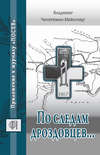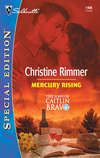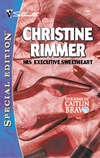Read the book: «Cat's Cradle»
Cat’s Cradle
Christine Rimmer
Contents
Prologue
One
Two
Three
Four
Five
Six
Seven
Eight
Nine
Ten
Eleven
Twelve
Prologue
Overhead, the desert night exploded with fireworks: trailing comets, rockets, bursting stars. It was the Fourth of July in Las Vegas, and Dillon McKenna was about to jump a motorcycle over the man-made volcano that erupted every fifteen minutes in front of the Mirage casino.
The crowd seemed to stretch out forever along the Strip. Dillon cruised down the middle of the street, working the crowd like the pro he was. He popped a few wheelies. He rose with a quick, agile leap and stood on the seat. For a moment, as he balanced like a wirewalker, he let go of the handlebars and carefully straightened to his full height. He bowed.
The crowd went nuts. They waved their miniature American flags and threw their red, white and blue hats in the air.
Under his breath, as he bent for the handlebars again, Dillon muttered a low curse. It was hotter than hell’s basement in the heavy crash helmet and the star-spangled jumpsuit that L.W. had ordered made especially for this jump. Sweat ran in Dillon’s eyes, burning. He blinked to clear it away.
He thought, This is the last jump for me. After this, I’m done.
The thought soothed him somehow. Made him care a little more about doing it right for the people this last time around.
The people had been good to him, over the years. They deserved a good show. They didn’t know that he was quitting. Nobody knew yet.
Dillon slid his feet off the sides of the seat and dropped. His boots landed neatly back on the pegs. He waved. The people screamed and stomped and waved frantically in return.
He’d reached Flamingo Road. Time to turn it around and head for the ramp. A voice from the small speaker inside his helmet told him he had two minutes before the volcano went off. He raced the engine, letting off the clutch just enough to make the tires scream and skid as he turned the bike. Then he gunned it again. The bike, which he’d modified himself for this jump, sounded good to him. It sounded just fine.
All up and down the Strip the chant had begun.
“Dil-lon. Dil-lon. Dil-lon. Dil-lon...” A thousand voices speaking as one. To Dillon the sound was barely more than a whisper beneath the roar of the bike.
“One minute,” the voice from the speaker inside his helmet warned. Then the countdown began. “Fifty-nine seconds, fifty-eight...”
Dillon gunned the engine again. He let out the clutch. The faraway chant of the crowd faded to nothing as he shot forward, picking up speed, headed for the takeoff ramp that rose over the lagoon at the foot of the volcano. He hit the base of the ramp and zoomed for the jump. Ahead and beneath him, the eruption began. A sharp, high burst of fire.
He took off from the ramp and soared out into the half block of nothingness going seventy-five miles per hour, with fire belching skyward below him. He rocketed higher, higher, leaving the people and the fire behind. He was standing on the foot pegs, gripping the handlebars, leaning forward, his eyes on the landing ramp, his mind on trajectories, on the arc of himself and the machine. And then he was over the top, into his descent, heading right on course for the landing.
He felt the heavy thud all through him as his rear wheel came down on the lip of the ramp. For a fraction of a second, he thought he was home free.
But then everything went wrong.
Too fast! I’ve hit the ramp too damn fast!
The thought came blasting into his mind as the bike came alive beneath him, fighting him. The handlebars ripped themselves free of his hands.
Nothing held him. He left the bike and catapulted into the air. He fell, somersaulting, noting in a distant way that beneath him, fire had rimmed the volcano and was beginning to bleed down the sides to set the lagoon aflame.
He came down hard on the ramp in front of the runaway bike. Man and bike became tangled. Over and over they tumbled toward the hard pavement below.
The last thing he heard before he blacked out was his dead father’s taunting voice echoing in his head.
It’s your last jump, all right, you worthless piece of trash. ‘Cause you’re a dead man...
* * *
He was back in his hometown of Red Dog City, California, standing on the Beaudines’ front porch. It was a fall evening. He could smell burning leaves. There was a chill in the air. He was seventeen years old. And mean Cat Beaudine was telling him off.
“All I asked was that you get my sister in by nine, Dillon McKenna. One little request. And you couldn’t manage it.”
Adora, Cat’s sister and his high school sweetheart, was holding on to his arm. He wanted to impress Adora. And he wanted to show Cat Beaudine that he was at least as tough as she was.
He opened his mouth to tell Cat Beaudine just what he thought of her.
No words came out.
The porch faded away. Someone said something about vital signs. Faces in surgical masks looked down at him. The eyes above the masks showed concern. From behind the masks came soothing words. About how he was all right. He was going to be all right.
And then he was back on the Beaudine porch again and Cat Beaudine was raising her daddy’s double-barreled shotgun and aiming it right at his heart.
That was when he knew this wasn’t real. In real life, Cat Beaudine had never actually pointed that gun at him; she’d only threatened that she might.
In the dream–or the hallucination or whatever it was–he could talk now. He asked Cat Beaudine, “Why do you care what your sister does? Why do you care if she gets home at night?”
Cat answered, “Somebody’s got to care. Somebody’s got to keep this family together. It’s not a job I volunteered for, Dillon McKenna, but it’s the job I got stuck with. It’s a school night. You said you’d get her in by nine.”
He was still staring down those double barrels. He watched in disbelief as Cat disengaged the safety and wrapped two fingers around the twin triggers.
He threw his hands up, shouting, “Hey, you can’t shoot me just for keeping Adora out an hour late!”
But Cat pulled the trigger anyway.
And pain erupted through him, white and hot. Teeth of fire dug his flesh away.
And somebody said, “Where’s the anesthesiologist? We’re only waiting for the anesthesiologist....”
* * *
Much later, he swam toward consciousness. The pain was different now. It was still there, still eating him alive, but they must have given him something powerful to ease it. Now the pain seemed to be consuming him from a distance. He knew it was bad, the worst he’d ever experienced. But it was kept at bay somewhere, waiting for the medication to wear off just a little so it could leap on him and devour him whole.
He turned his head and cautiously opened his eyes. An IV drip stood by the metal side rail of the bed. It was hooked up to his arm. There was some machine close by that made little bleeping sounds, like bubbles singing underwater. The air smelled of disinfectant overlaid with the scent of flowers. The flowers were everywhere, intended, no doubt, to cheer up the invalid: him.
And there were voices, from across the room.
They whispered to each other.
“My God, L.W. I just can’t.”
“You can. You will. McKenna needs you now.”
“They say he may never walk again. He may be in a wheelchair for the rest of his life. It’s too awful, too ugly, I just can’t–”
“For God’s sake, Natalie. Get a grip on yourself. He’s waking up.”
He looked toward the sound of the voices. Two familiar faces swam into focus. Natalie, the woman he had meant to marry. And L.W., the man who’d made his name a household word. Both of them were looking right back at him, their mouths stretched into big, brave smiles.
He felt sorry for them, in a removed sort of way. He wasn’t going to be much use to either of them now. Just as neither of them was going to be much use to him. Because he didn’t kid himself. He’d been broken up enough in his time to have a vague idea of what he was in for. He may have survived his final jump after all. But hell was still waiting for him–a living hell.
A sharp longing pierced him, worse, in a way, than the pain that waited to eat him alive.
It was a longing for home. And for the kind of woman who could take the tough times; a woman strong enough to stand by his side while he endured the months of torment and superhuman effort that were coming up next.
One
Eighteen months later....
Cat Beaudine stood in the doorway of her sister’s bedroom. She took in the room at a glance. On the dresser, the small color television soundlessly played the 11:00 p.m. news. There were balled-up tissues everywhere, looking like sad, crumpled paper flowers, used and discarded in drifts and trails across the pink satin sheets of the bed. In the center of the crumpled satin, surrounded by all those used tissues, Cat’s sister, Adora, lay sprawled facedown sobbing forlornly.
Adora’s most recent boyfriend, Farley Underwood, had left her. And, as always, Adora had called Cat.
Slowly, as if it pained her to lift her head, Adora looked up. She let out a strangled cry. Then she reared back on her knees, her tousled brown hair curling enchantingly around her pretty, flushed face, her cream silk negligee slipping off one shoulder. “Oh, Cat!”
Cautiously Cat approached the bed.
Adora dabbed at her streaming eyes with a wadded-up tissue. “Oh, Cat. Thanks for coming. For always being there over all the years. For being the best big sister in the world. I don’t know what I’d do...without you.” With a desolate moan, Adora held out her arms.
Cat sank to the edge of the bed and allowed herself to be enveloped in her sister’s misery and the heady scent of Adora’s perfume.
Adora moaned against Cat’s heavy winter jacket. “I’m sorry. To be such a pain. But I had to have someone. Some family. You understand, don’t you?”
Cat made a small, sympathetic sound; all that was required at the moment.
Adora sobbed on. “Why me? What is it about me? Why does every man I ever meet end up dumping me? All I ever wanted was what my two baby sisters have. A good man. A family. Someone to take care of me and someone I can take care of in return. Is it too much to ask? Is it unreasonable to hope for?” Adora gave another quivering whimper. “Is it?”
“No, of course it’s not.”
“Of course it’s not!” Adora picked up Cat’s words and gave them back in a wail. “But it never happens. I’m thirty-four years old. How long do I have to wait? And I’m not like you, Cat, perfectly happy wandering around the woods in work boots and baggy jeans with no man in sight, wanting to live out in the middle of nowhere alone in some ancient, run-down shack. I’m just a woman. An ordinary woman. I want a home, with nice window treatments and a baby on the way.”
Adora surrendered to a fresh fit of weeping. Cat held her and made the required soothing sounds. Eventually Adora calmed a little. Then Cat put her arm around Adora and said the things she always said whenever Adora lost a boyfriend.
“You’re too good for him.... You’re better off without him.... Someone terrific will come along soon....”
Adora listened, tucked up in the hollow of Cat’s shoulder, and made tiny, woebegone noises of agreement.
“Oh, Cat. Do you really think the right man could still come along?”
“Of course I do. I promise you. It’s only a matter of...”
But Cat didn’t get any farther, because Adora wasn’t listening. Adora was gaping at the television instead.
“Omigod!” Cat’s sister exclaimed in an ecstatic whisper.
Cat looked at the television. One of those late-night talk shows had come on. A host Cat didn’t recognize was interviewing some dark-haired hunk in designer jeans and fancy alligator boots. “What? What is it?”
Adora clutched a wadded-up tissue to her breast and pointed at the television. “It’s Dillon. Dillon McKenna. Turn it up. Cat, turn it up!” When Cat didn’t move, Adora frantically fumbled around under the mountain of pillows at the head of the bed and came up with a remote control, which she pointed at the television. The sound came on.
“So, Dillon.” The host held up a book with a photograph of a gruesomely wrecked motorcycle on the dust jacket. Beneath the crumpled motorcycle, the word Daredevil was printed in letters that seemed to be on fire. “Tell us about this book you’ve written.”
Cat made a low noise of disbelief. “Oh, please. Dillon McKenna never wrote a book. I don’t buy that for a minute.”
“Shh!” Adora hissed and craned forward toward the small screen. “Oh, God. He looks wonderful.... You can’t even see how bad he was hurt in that awful crack-up in Las Vegas. He looks just like before.”
On the screen, the dark-haired hunk began to talk. “Well now, if you look down in the corner there, you’ll see that I didn’t write it.” He nudged the slender, serious-looking man sitting next to him. “Oliver here did that. He’s the writer.”
Oliver picked up his cue. “But the story is authentic. Just as Dillon told it to me. From his early days in rodeo, through his years as a movie stuntman, right up to the challenges he set himself. Nothing’s missing. There’s every jump he ever accomplished, including that baker’s dozen Peterbilt semitrucks at the Anaheim Speedway. And, of course, the story finds its climax in Dillon’s spectacular, near-death experience in Las Vegas just a year and a half ago.”
Cat watched her sister watching Dillon McKenna. Adora’s face wore a dreamy, faraway look. Farley Underwood might never have existed.
“Dillon really did turn out to be a fantastic-looking man, didn’t he, Cat?” Adora asked.
Cat didn’t even bother to look at the man on the screen. One answer was expected of her. She gave it. “Sure.”
On the television, the host asked, “So what’s up next for Dillon McKenna?”
“You know, I gotta say I’m not sure.”
“No kidding?”
“Yeah. Things are going to be different for me, that’s all I know for certain. I think what I need right now is a real change of scene, a little time away from it all, to decide where I’m going from here.”
Cat only half listened to the rest. She busied herself gathering up some of the drifts of discarded tissues and tossing them into the wastebasket in the corner, waiting for the next commercial break.
At last, her sister raised the remote control and punched the Mute button again. Then Adora sighed. “Oh, Cat. He made good, didn’t he? Dillon really made good.”
There was no arguing with that. Cat smiled. “He certainly did.”
“Did you hear what he said, about not knowing what he was going to do next? About how he’s thinking he needs a little time away from it all?”
“Yeah, I heard it.”
Adora’s emerald eyes were shining. “Do you imagine he might come back home?”
Cat imagined no such thing. The way she saw it, there was absolutely no reason on earth why an international celebrity like Dillon McKenna would want to return to the tiny mountain town of Red Dog City.
“Well?” Adora prompted.
“Well, what?”
“You heard me. Don’t you think that he might come home?”
“No, I don’t.”
Adora frowned. Cat’s answer had not been the one she’d hoped for. But then she brightened again. “If he did, you’d be the first to know, wouldn’t you? After all, you take care of his house.”
Cat picked up a few more tissues and aimed them at the wastebasket, achieving a swift series of slam dunks. Then she pointed out patiently, “Adora, he hasn’t stayed there even once since I’ve been caretaker of that place. He rents it out through the real estate agency that hired me to take care of it. It’s just income property to him.”
“Well, I know. But still. It’s a nice house. If he wanted to get some time to himself, to think about life and things, that house would be just the place to go.”
Cat reached for her sister’s hands and clasped them firmly in her own. “Look.” She put her forehead against Adora’s. “Will you forget Dillon McKenna? Think about yourself. Are you feeling better now?”
Adora pulled her hands free and fiddled with her shredded tissue. “I guess you want to go home and go back to bed, huh?”
“I’d be lying if I said no. But I’ll stay if you—”
“No. Really. Seeing Dillon again kind of cheered me up. I suppose I’ll be all right now. At least all right enough to make it through the night.”
“Good.” Cat bent forward to brush her lips against Adora’s cheek.
Adora forced a brave smile. “Thanks again. I mean it.”
Cat stood. “I’m at home if you need me.”
“I know.”
Two
Dillon McKenna climbed down from his Land Cruiser, ignoring the dull throb in his artificial hip joints as he did it. The snow on the ground made a crisp, crunching sound under his boots.
The house looked good, he thought. From this side, it was all natural colored wood and soaring angles. The other side, which faced the deck and a deep ravine, was floor-to-ceiling windows so that even on the darkest days, the place was full of light.
Dillon took in a big breath, savoring the cold, mountain freshness of the air. From a nearby fir tree, a chickadee trilled at him. And from somewhere not far away came the thwacking sound of an ax splitting wood. Be- neath a spruce tree at the side of the driveway a blue pickup was parked: the caretaker’s, Dillon imagined. Dillon shut the door of the Land Cruiser, flipped up the collar of his sheepskin jacket and followed the sound of the ax.
He didn’t have to go far. Around the other side of the house, on the little ledge of level ground that extended below the deck before the land dropped off into the ravine below, he found the caretaker. The man’s back was turned to Dillon and for a moment, Dillon stood and watched him.
Rhythmically and efficiently, the man sunk his ax into a log, lifted the log high and brought it down on the chopping block. Bemused, Dillon admired the grace of movement, the economy of each stroke.
He smiled to himself. Nineteen months ago, he wouldn’t have looked twice. But there was something about having half the bones in your body broken, about being put back together with plastic and metal and a good surgeon’s gall, that made a man appreciate the simple things—like watching a skinny caretaker whack up the firewood.
Just then, the caretaker seemed to sense that he was being observed. He brought the ax down so it bit into the block. Then, leaving the ax stuck there, he straightened and turned.
Dillon noticed right away that the fellow had delicate features and smooth golden skin. But it took him a few seconds to register that the man also had breasts—high, round breasts, which very nicely filled out the front of his—er, her—worn red flannel shirt.
As Dillon gaped, the man who had turned out to be a woman removed the work gloves she was wearing and shoved a hand through her shock of short, raggedly cropped straw-colored hair. Then she squared her slim shoulders and strode purposefully toward him.
As she drew closer, he noted that her eyes were the shimmering gray-blue of a scrub jay’s wings. Recognition dawned in those eyes at precisely the moment he realized who she was: Adora’s overprotective big sister, Cat Beaudine.
Home at last.
The thought rose from the depths of him and bloomed on the surface of his mind. It occurred to him that he’d dreamed of her, though he couldn’t remember when or what the dream had been about.
“Dillon? Dillon McKenna?” Her disbelief was clear in her voice.
He felt a wide smile break across his face. “The very same. Hello, Cat.”
Now she was the one gaping. Dillon could understand that. Aside from a possible occasional glimpse of him on the news or in a magazine, she hadn’t seen him in about sixteen years. She very well might have been at his father’s funeral seven years ago, but he didn’t remember seeing her then. In any case, it had been a long time. It would naturally take her a minute or two to get used to the changes time makes. Seeing her again had sure given him a jolt.
Dillon stuck out his hand. They shook. Her palm was rough, callused from hard work. Her bones, though, were fine and long. He let his gaze wander, noting the dew of moisture on her upper lip and the charming way her pale hair curled, damp and clinging, at her temples. Her body heat came off of her in waves after her efforts with the ax. Her scent, on the cold winter air, was both sweet and faintly musky.
Within his own, her hand jerked a little. He realized he’d held on longer than was probably appropriate. Reluctantly he let her go.
She forged ahead with the pleasantries. “How are you?”
“All grown-up now.”
A small vertical line appeared between her brows. “Yes. Yes, I see that.” She sounded preoccupied suddenly—and not pleased at all that he wasn’t a kid anymore.
Dillon felt jubilant. He was thoroughly enjoying himself. She was exactly the way he’d remembered her. Except for one thing: back then, he hadn’t thought her intriguing in the least.
“Ahem. Well.” Now she was making a big deal of pulling her gloves back on—to let him know she was returning to the chopping block, he imagined. “This is a surprise. When the agency called to tell me to open up the house, I figured—”
“That the new occupant was just another one in the endless chain of short-term tenants?”
She nodded. “But then, I suppose I should have expected it might be you, now I think about it. We heard you were looking for a little time away from it all.”
“Where’d you hear that?”
She looked away for a moment, as if she hesitated to tell him. Then she shrugged. “You said it. On some late-night TV show a few weeks ago.”
He couldn’t resist a little jab. “I’m surprised you were watching. You never were a big fan of mine.”
She looked right into his eyes then. “Hey. Out here in the wilderness, we like to keep informed about the ones who made it big. And you picked the right place if you want to be alone. Six miles outside of Red Dog City in the dead of winter is about as alone as anybody could want to get.”
He chuckled. “It’s less than forty miles to Reno, in case I get too lonely.”
“Those can be very rough miles when the heavy snows come.”
“I know that. I was raised in these parts.” He dared to tease her. “Are you trying to get rid of me already, Cat?”
She didn’t smile. “No, of course not.”
“Good. Because I’m here to stay—for a while, at least.”
“Well, that’s your business.”
“You’ve got it right there.”
They stared at each other. Then she coughed. “Listen, I’m sure you want to get comfortable. You’ll find the house was cleaned from top to bottom.”
“By you?”
She shook her head. “I don’t clean houses. The agency hires a service for that.” She went on briskly, “The water’s on and I turned on the heat a couple of hours ago, so it should be pretty warm by now. I was just trying to get in a little more wood, in case you’d also like a fire. I don’t know who took care of delivering your wood for you, but most of the logs are too big for your stove.”
Dillon experienced the most ridiculous urge then. He wanted to march over to where her ax was embedded in the block and hack up a few logs himself, just so she’d know he was as much of a man as she was. The urge totally astonished him. Lately Dillon thought of himself as grown beyond minor displays of masculine ego.
And besides, he’d probably only end up doing damage to himself if he started showing off with an ax right now. He was still learning to control all the new pins and balls he had where a lot of his joints used to be.
“So anyway,” she was saying, “I’ll just get back to work. I’ll finish up here, then carry a load inside and lay the fire for you.”
He had a better idea. “Listen, forget splitting any more wood for now.”
“But I—”
“Just bring a load into the house and get the fire started. I’d appreciate that.”
“Okay, I—”
“And then we’ll have a beer.”
It took her a moment to absorb that suggestion. Then the protests began. “No, I—”
“Come on. For old times’ sake.”
Her glance collided with his for a moment, then shifted away. “No, really, I—”
“Yes.”
She looked at him again, stared straight into his eyes and tried to shake her head. She didn’t succeed. “All right.” The minute the words were out, her face flushed a captivating shade of pink beneath her tan.
“Good.” He strode toward her and brushed past, leading the way before she could change her mind. “The beer’s in my truck. I’ll get it and join you inside.”
From behind him she made a strangled little sound that was probably the beginning of a protest. He didn’t wait to hear the end of it, but trudged away from her as quickly as his rebuilt hips and reconstructed left knee would carry him.
By the time he’d put the Land Cruiser in the garage and let himself into the kitchen, she was standing on the other side of the glass door that opened onto the deck, her arms loaded with firewood. She spotted him through the glass and telegraphed a questioning look. He set down the bag of groceries and the six-pack of long necks he’d brought in with him and hurried across the huge main living area to let her in.
Once inside, she tossed the wood into the box by the wood stove, then pulled off her gloves and stuck them in a back pocket. Dillon went to get two beers from the six-pack on the counter as she knelt to lay and light the kindling. He took a few minutes to empty the bag of groceries and when he returned, she was feeding in a couple of midsize logs. That done, she rose.
He handed her a beer. They both drank. Through the window of the stove, the fire licked at the wood, a cheerful sight.
Dillon gestured in the general direction of a couch and two chairs, which were grouped nearby. “Have a seat.”
Cat shook her head and looked down at her old shirt and khaki work pants. “That couch is beige. And I’ve been under the house checking the pipes.”
He started to tell her he couldn’t care less about the damn couch. But then he decided that the state of her clothing was only an excuse. She didn’t want to sit down. She didn’t want to get too comfortable.
He let it pass and stared out the wall of windows. Beyond the deck the world seemed to drop away into a sea of snow-laden evergreen. In the distance, the mountains overlapped each other, disappearing into a gray veil of afternoon mist.
“I can hardly believe I’m here,” he mused aloud after a moment. He glanced around the big room and then out the windows at the spectacular view once again. “God. It’s beautiful.”
“Yes.”
He lifted the beer and drank, then found himself telling her, “I bought this house seven years ago.”
She made a sound of polite interest, but said nothing.
“It was after my father died. I saw an ad for the place while I was here, so I drove out to see it. I fell in love with it and took it. I think it made me feel that I’d arrived, the fact that I could buy a vacation house just because the mood struck me.”
She spoke then, her tone matter-of-fact. “You’ve done well for yourself, Dillon. You have a right to be proud.”
He studied her, thinking about changes. Pondering the effects of time. Deciding that the way a man saw the world sometimes changed more than the world itself. Like the woman before him.
Sixteen years ago, he hadn’t seen the deep inner calm she possessed. Or the world of strength and dignity in her eyes. Hell. Back then, he hadn’t given a damn for strength and dignity in a woman. He’d thought her tough and mean—and she had been. He was sure she still was when circumstances demanded.
“We heard you had a bad accident a while ago,” she said.
“Yeah. I jumped a man-made volcano at the Mirage in Las Vegas. The jump was a success. Unfortunately my landing left a lot to be desired.”
Now her eyes were kind. “I’m sorry.”
“Hey. Breaks of the game.”
“Well, at least you look as if you’re recovering well enough.”
“More or less. Everything works, just slower and stiffer.” He raised his beer and drank. “So tell me about home.”
“What about it?”
“Well, the Beaudine family, for starters, I suppose. You can tell me how your mom is and how all your sisters turned out.”
She fiddled with the label on her beer bottle, as if she suspected he’d just thrown her a trick question. “My mother’s remarried.”
“No kidding?”
“Yep. Just a few years ago, to a retired housepainter. She met him playing bingo over at the community hall. You could say he sort of swept her off her feet, I guess. They tied the knot a few months after they met and they live in Tucson now.”
“What about the little ones?”
“Phoebe and Deirdre?”
“Yeah.”
“They’re not so little anymore. Both married, as a matter of fact. Deirdre lives in Loyalton. And Phoebe’s in Portola.”
“Not too far away, then?”
“Right.” She took another sip of beer.
“And how about you? Are you married?”
“Me?” She looked surprised that he’d ask such a question. “No, not me.”
It was the answer he’d expected, but still, he’d wanted to be sure. He was tempted to probe a little deeper on the subject, to ask her why not? just to see how she’d answer. But he decided against that. She was too edgy. Any probing on his part would probably send her flying out the door.
He kept it light and predictable. “How about nieces and nephews? Got any of those yet?”
“Five.” She was fiddling with the bottle’s label again. “Deirdre has three daughters. And Phoebe has two boys.”
The free excerpt has ended.





















